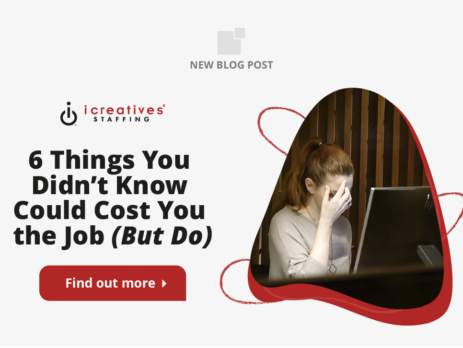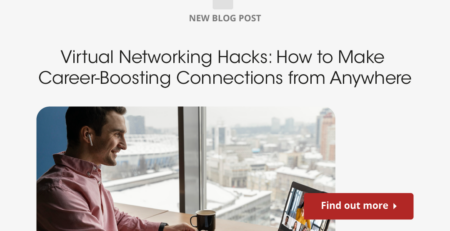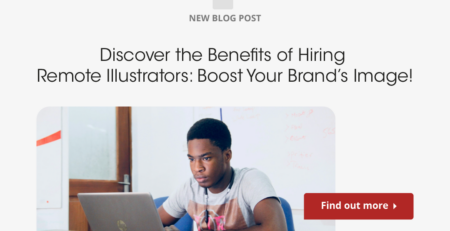6 Things You Didn’t Know Could Cost You the Job (But Do)
When it comes to job hunting, most people think of obvious factors that can disqualify them—like lacking required skills or not meeting experience levels. However, the hiring process is much more nuanced, and sometimes it’s the small, overlooked details that can ruin your chances. Recruiters and hiring managers evaluate far more than just your resume. They look at how you present yourself, how you communicate, and even subtle cues that speak volumes about your professionalism.
What may surprise many candidates is that certain behaviors, habits, or seemingly minor missteps can be the reason for rejection. These issues often go unnoticed by job seekers but are clear red flags to those making the hiring decision. This gap in awareness is why understanding the less obvious deal-breakers can set you apart from other applicants.
The competitive job market amplifies the impact of these mistakes. With so many qualified applicants vying for the same positions, companies are quick to filter out anyone who raises doubts—even slightly. That means avoiding these hidden pitfalls is just as important as showcasing your strengths. You might have the perfect resume, but a single overlooked detail could cost you the opportunity.
By shining a light on the hidden mistakes that often go unmentioned in typical job advice, we give you the tools to sharpen your approach. Knowing what hiring managers really notice, beyond the obvious, can help you prepare more strategically. This awareness isn’t just about landing a job—it’s about building a reputation for professionalism and reliability.
In this article, we’ll break down six things you didn’t know could cost you the job. Through frequently asked questions, practical tips, and examples, you’ll gain a deeper understanding of the hiring process. Whether you’re applying for your first role or advancing in your career, avoiding these pitfalls can make all the difference in your job search.
Most Asked Questions About 6 Things You Didn’t Know Could Cost You the Job (But Do)
- Why do small mistakes during an interview matter so much?
- How can poor communication habits cost me the job?
- What role does body language play in the hiring decision?
- Can being unprepared with company knowledge really eliminate me?
- How does lack of follow-up affect my chances of getting hired?

Why do small mistakes during an interview matter so much?
Interviews are high-stakes environments where employers scrutinize every detail of your behavior, communication, and preparedness. While candidates often prepare for big questions about skills and experience, small mistakes can undermine an otherwise strong impression. Recruiters often see these slip-ups as indicators of larger professional issues.
For example, arriving late—even by five minutes—signals unreliability. Forgetting to silence your phone can show carelessness. These may seem minor to you, but in a competitive field, they stand out. Employers interpret small lapses as potential signs of how you’d act on the job.
Think of it this way: if two equally qualified candidates are being considered, and one makes small mistakes while the other executes flawlessly, the choice becomes clear. The margin for error is slim, which is why small details matter. In essence, these “small” mistakes add up to big consequences.
Recruiters often rely on these details to separate serious candidates from those who may not be as committed. First impressions are formed within seconds, and they are notoriously difficult to reverse. This is why small mistakes have a disproportionately large impact on hiring outcomes.
Here are some common small mistakes candidates make that often cost them the job:
- Failing to make eye contact
- Speaking negatively about past employers
- Not bringing a copy of your resume
- Interrupting the interviewer
- Dressing inappropriately for the role
In addition, recruiters value professionalism because it reflects how candidates will interact with clients and colleagues. Even if the position is technical, soft skills and attention to detail are critical. These qualities shine—or falter—through small behaviors.
Companies also have limited time and resources during recruitment. They are looking for reasons to narrow down the candidate pool, and small mistakes provide easy justification. That’s why even seemingly minor missteps can lead to rejection emails.
A great strategy is to prepare beyond the technical questions. Practice your body language, arrive early, and rehearse answers to common questions. Don’t underestimate logistics like planning your commute or organizing your documents. Preparation eliminates opportunities for small errors.
Ultimately, small mistakes matter because they tell employers whether you take the process seriously. Treat every interview like it’s the only opportunity you’ll have. That level of care will help minimize errors that could derail your chances.
For more tips on standing out during interviews, check out our blog post on 5 Red Flags Recruiters Spot Instantly During Interviews.
How can poor communication habits cost me the job?
Communication is one of the most critical skills employers evaluate during the hiring process. Regardless of industry, effective communication influences how well you collaborate, convey ideas, and handle conflict. Poor communication habits often signal potential workplace challenges, which is why they can cost you the job.
For instance, overly long-winded answers may indicate disorganization, while giving short, vague responses might suggest lack of engagement. Both styles leave employers questioning your ability to handle professional conversations. Striking a balance is essential.
Another common misstep is failing to listen actively. Candidates sometimes focus too much on what they’ll say next, ignoring what the interviewer is asking. This can lead to irrelevant answers and frustration on the employer’s side. Active listening builds rapport and demonstrates respect.
Email communication also plays a role in recruitment. Poor grammar, lack of structure, or an overly casual tone in emails can leave a bad impression. Employers see these as reflections of how you’d communicate with clients or team members on the job.
One way to avoid these pitfalls is to practice clear, concise, and confident speech. Rehearse responses to common interview questions, but avoid sounding robotic. Structure your answers using the STAR method (Situation, Task, Action, Result) for clarity and focus.
Here’s a simple table showing effective vs. poor communication behaviors during interviews:
| Effective Communication | Poor Communication |
| Listening attentively and responding thoughtfully | Interrupting or ignoring interviewer cues |
| Using positive, professional language | Speaking negatively about past employers |
| Structuring answers with clear examples | Rambling without direction |
Employers also evaluate non-verbal communication. Tone of voice, posture, and eye contact all contribute to how your message is received. Misalignment between verbal and non-verbal communication can cause confusion or mistrust.
Poor communication habits don’t just harm your chances of getting hired—they can also impact long-term success if you land the job. Employers prefer candidates who can represent the company professionally in all contexts.
To improve, consider recording yourself answering interview questions and analyzing your clarity, tone, and pacing. Feedback from a mentor or career coach can also highlight blind spots you might not notice on your own.
For strategies to strengthen professional relationships, visit our article on Soft Skills Matter Now More Than Ever, According to New Research from Harvard Business Review.
What role does body language play in the hiring decision?
Body language is a silent but powerful form of communication that recruiters evaluate closely. While your words communicate skills and experiences, your body language reveals confidence, engagement, and authenticity. Even when you prepare perfect answers, poor non-verbal cues can damage your credibility.
Common mistakes include slouching, crossing arms defensively, or avoiding eye contact. These signals often suggest disinterest, nervousness, or lack of confidence. Conversely, open posture, steady eye contact, and appropriate gestures convey professionalism and enthusiasm.
In high-pressure situations like interviews, candidates may unintentionally display negative body language due to stress. Recruiters, however, may interpret these signs as character traits rather than temporary nerves. That’s why managing body language is crucial.
One often overlooked factor is microexpressions. Quick, involuntary facial expressions can reveal emotions you may be trying to conceal. While you can’t control every microexpression, maintaining a positive baseline demeanor helps minimize negative impressions.
Here’s an overview of positive vs. negative body language recruiters notice:
- Positive: Leaning slightly forward shows interest.
- Positive: Smiling genuinely conveys warmth.
- Negative: Fidgeting indicates nervousness.
- Negative: Avoiding eye contact suggests insecurity.
Practicing body language awareness can be as important as rehearsing your answers. Mock interviews with a coach or mentor can help identify habits you may not notice. Video recordings are also effective tools for self-evaluation.
Employers seek candidates who project confidence without arrogance. Balanced body language demonstrates that you can communicate effectively, work well with others, and adapt to professional environments.
In group interviews or panel settings, body language plays an even greater role. How you shift focus between multiple interviewers can reveal inclusivity and engagement. Neglecting one panelist may suggest selective listening.
Ultimately, body language influences whether your verbal communication is trusted. Recruiters may not consciously note every gesture, but they form impressions based on overall consistency between words and actions.
Can being unprepared with company knowledge really eliminate me?
Yes—lack of preparation about the company is one of the fastest ways to lose an opportunity. Employers expect candidates to demonstrate genuine interest and initiative. When you fail to research, it signals that you may lack motivation or commitment.
Hiring managers often ask questions about company values, recent projects, or industry trends. A vague or uninformed response makes it clear you didn’t take the time to prepare. In contrast, informed answers show enthusiasm and alignment with the organization’s goals.
Preparation also helps you tailor your responses. For example, knowing about a company’s recent product launch allows you to connect your skills directly to their needs. This level of detail is compelling and sets you apart from generic candidates.
Unpreparedness can also affect your ability to ask insightful questions. Employers usually provide time for you to inquire about the role or company. If your questions are shallow—or worse, nonexistent—it weakens your candidacy.
Here’s how lack of company knowledge can cost you the job:
- Shows lack of genuine interest in the role.
- Suggests poor research and preparation skills.
- Weakens your ability to engage in meaningful conversation.
- Reduces your chance to stand out among other applicants.
- Signals potential lack of long-term commitment.
Fortunately, preparing doesn’t require excessive time. Start with the company’s website, review press releases, and check their social media activity. LinkedIn company pages also provide updates that can guide your preparation.
Employers want candidates who are proactive and resourceful. Demonstrating that you’ve researched the company not only boosts your credibility but also shows that you’re excited about the opportunity.
Preparation also allows you to identify whether the company is the right fit for you. Understanding their culture, mission, and industry position empowers you to make informed career decisions.
In a market where employers can choose among dozens of qualified candidates, being prepared gives you an edge. It transforms you from a passive applicant to an engaged, motivated professional.
How does lack of follow-up affect my chances of getting hired?
Follow-up is one of the most underestimated steps in the job application process. Many candidates assume their role ends after the interview, but employers notice who takes the initiative to send a thank-you message. Neglecting this step can make you appear indifferent.
A thoughtful follow-up shows appreciation, reinforces your interest, and gives you an opportunity to highlight key points discussed during the interview. Without it, recruiters may question whether you’re truly motivated.
Here are key benefits of following up:
- Reaffirms your enthusiasm for the role.
- Strengthens your professional impression.
- Keeps you top-of-mind among candidates.
- Allows you to address any points you may have missed.
On the other hand, failing to follow up can lead employers to assume disinterest. In competitive hiring processes, small details like this can be deciding factors between equally qualified candidates.
Timing also matters. Ideally, you should send a thank-you note within 24 hours. This demonstrates attentiveness and professionalism while the interview is still fresh in the recruiter’s memory.
Here’s a quick table on effective vs. ineffective follow-up practices:
| Effective Follow-Up | Ineffective Follow-Up |
| Sending a thank-you email within 24 hours | Not following up at all |
| Personalizing message with specific interview details | Sending a generic, copy-paste email |
| Reinforcing enthusiasm and fit for the role | Rehashing your entire resume |
Employers often see follow-up as a sign of strong interpersonal skills. It indicates you’ll handle future communications with clients, colleagues, and stakeholders in a professional way.
Failing to follow up can also impact networking opportunities. Even if you don’t get the job, maintaining positive communication leaves doors open for future roles.
If you’re unsure what to say, keep it simple: thank the interviewer, mention one highlight from the conversation, and restate your excitement about the role. Concise, genuine messages are most effective.
Conclusion
The job search process is about more than just presenting your skills and experience—it’s about how you present yourself in every interaction. Small mistakes, poor communication, negative body language, lack of preparation, and failure to follow up all contribute to the impression employers form of you. These seemingly minor issues often make the difference between getting an offer or being overlooked.
By understanding these hidden pitfalls, you gain a competitive edge. Employers are looking not only for candidates who can do the job but also for those who demonstrate professionalism, reliability, and enthusiasm. Every detail, from the way you walk into the room to the email you send afterward, tells a story about the type of employee you’ll be.
The good news is that these mistakes are preventable. With awareness, preparation, and practice, you can avoid common pitfalls that cost other candidates the job. Being mindful of both verbal and non-verbal cues ensures consistency in how you present yourself.
Job seekers who master these details often stand out in crowded applicant pools. They’re remembered as attentive, professional, and motivated—qualities that hiring managers value highly. By controlling the controllable, you position yourself as the best possible choice.
Ultimately, landing the job isn’t just about avoiding mistakes. It’s about building trust through every interaction. Trust that you’re prepared, capable, and a positive fit for the company culture. That trust begins the moment you apply and continues well past
In today’s competitive market, finding the right creative and marketing expert can be a challenge. But with icreatives, you’re in experienced hands. With 37 years in staffing and a track record of matching more than 10,000 employees to over 1,000 companies worldwide, we know how to connect you with the best. Plus, you only pay if you hire—there’s no risk, only results. Ready to find your perfect creative or marketing expert? HIRE WITH ICREATIVES today!












